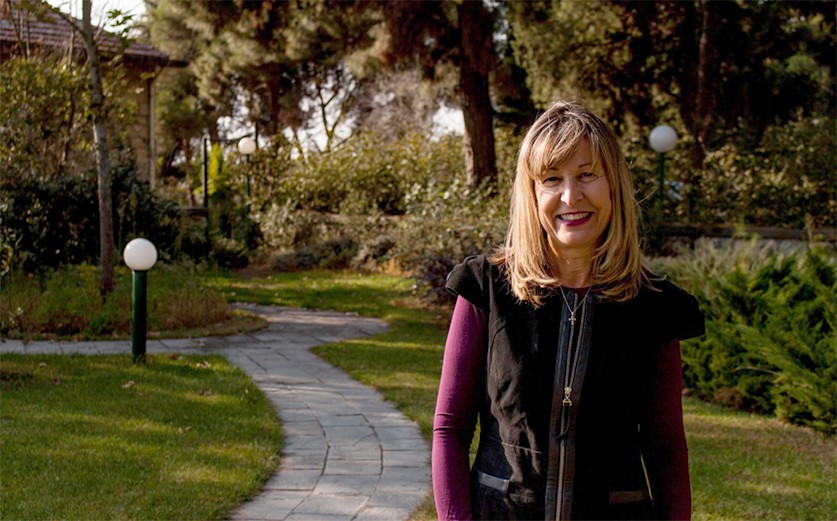Meet Maria
Maria Soumelidou, 56, was born and lives in Thessaloniki. Her family is Pontic Greek, from the Black Sea. She is in charge of the unit “Legal Framework and Ethics in the Tourism Sector” in NANG’s Alternative Tourism program at the American Farm School.
Maria has always liked animals, and as a 16-year-old student at Anatolia College, she joined the Skyrian Horse Club. As a member of the club, she started riding and learned more about the endangered horses. The Skyrian horse is a miniature horse found on the island of Skyros, one of the rarest horse breeds in the world. These were the horses that supposedly pulled Achilles’ chariot and were immortalized on a Parthenon frieze. Moved by a desire to save the Skyrian horse, Maria worked for the association and became its president after graduation.
“Not only did we aim to disseminate information about the Skyrian Horse, but we worked with public and private bodies in Skyros and Thessaloniki to raise awareness about the importance of this breed and how it could be used to shape the touristic identity of the island,” Maria said. “And though we didn’t have much money, we sent blood samples to American universities so that they could test the DNA and confirm that the horses were of ancient origin.”
Years later, as a graduate student in Farm Management in the Department of Agronomy at Reading University in the UK, Maria made the management of Skyrian horses the subject of her master’s thesis. Now there are different units on Skyros who are implementing her ideas, and they have managed to save the species. “It’s heart-consuming work,” Maria said. When she started work on Skyros, there were less than 100 horses. Now the breed exists not only in larger numbers on Skyros but at Aristotle University in Thessaloniki and on the island of Corfu.
Teaching at the American Farm School
After receiving her master’s degree, Maria worked in England for a few years before returning to Thessaloniki to work at the American Farm School (AFS) and at other agricultural enterprises. She worked at Tsantalis Winery, implemented EU policies with Euroconsultants, and lectured in seminars and forums funded by the EU in Northern Greece. Her first job in Greece was at AFS as a coordinator in the Thessaloniki International Training Program, which aimed at teaching educational leaders in Africa how to implement a model like the American Farm School. Maria then decided to go back to school and study law at Aristotle University. “I was 34, married, and pregnant with twins, and I had to take the bar exam in these tiny chairs!” she said. For 10 years, she worked as a freelance lawyer in her father’s notary office.
Maria has spent the past 8 years teaching Principles of Law, Management, and Marketing at Perrotis College, which is accredited by Cardiff Metropolitan University. For NANG, she teaches in the Alternative Tourism program and coordinates a project where each year, students propose a new touristic identity for a selected region in Greece. This project gives students the opportunity to put into practice what they have learned over two semesters in the program. They propose a plan to revitalize the site and expand the touristic period, which they present to the local authorities and business owners at the end of the spring semester. Last year, the program “adopted” the mountain village of Elatochori Pierias, which neighbors Katerini and Mount Olympus; this year, the program “adopted” the city of Xanthi in Thrace. The students designed and implemented a professional, international conference aimed at linking Xanthi’s gastronomic identity to a rare breed of shorthorn cattle, which they promoted as a social and cultural resource. They also proposed and demonstrated new trends in tourism, like the dramatization of Xanthi’s past and movement activities within the urban environment, and both were successful.
“I would like to see Elatochori and other destinations implement our plans and work towards solutions,” Maria said. “Tourism is now the main industry in Greece, and if we are to change people’s attitudes about what Greek tourism is, we need education. The Alternative Tourism program gives students the rare opportunity to meet people like them, to collaborate and create synergies, to implement exciting and innovative ideas together. They come from all different backgrounds, but they have the same dream. I want to see our students start new companies here in Greece or offer their specialized knowledge to serious alternative tourism businesses.”

